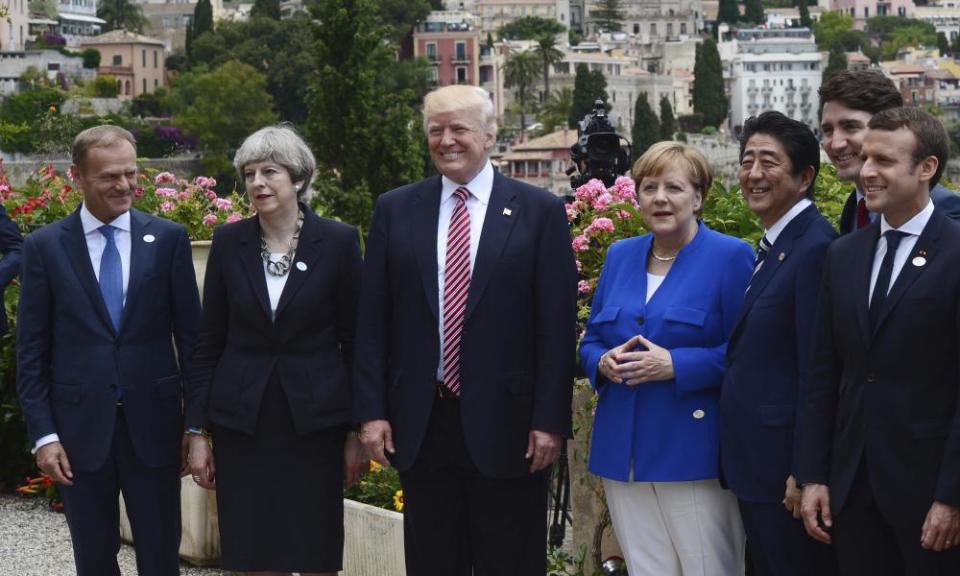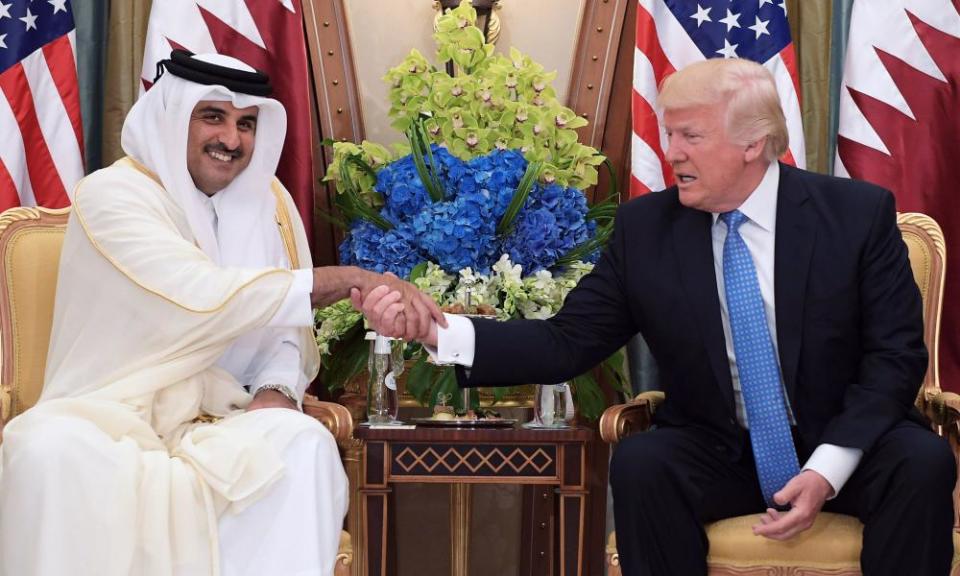How Trump’s actions and tone affect US alliances and perception on global stage
Trump’s foreign policy approach has stunned observers, but recent weeks have underscored potential ramifications of his loose rhetoric and abrupt policy shifts

In less than 140 characters, Donald Trump had left the chairman of the Senate foreign relations committee speechless.
Senator Bob Corker, a Republican from Tennessee, could barely mask his disbelief when reporters on Capitol Hill informed him of tweets in which Trump accused Qatar, a close US ally, of being a state sponsor of terrorism. “The president?” Corker asked, lowering his register.
It was not until Corker read the tweets from one reporter’s cellphone that he appeared to process the information. And even as Corker, once on the shortlist to be Trump’s secretary of state, sought to emphasize the American tradition of working with all of its Gulf state allies, his words gave way to prolonged moments of silence.
Since taking office in January, Trump has repeatedly stunned observers both at home and abroad with his irreverence for American foreign policy norms and unconventional approach to relations with allies and foes alike. But recent weeks have underscored, even according to some within his own party, the potential ramifications of the president’s loose rhetoric and abrupt policy shifts.
The past few weeks alone brought a number of diplomatic fissures.
During his first foreign trip as president, Trump refused to reaffirm the US’s commitment to Nato’s Article 5 – the principle of collective defense – and ignored the pleas of allies at the G7 summit in Sicily by withdrawing from the landmark Paris climate accord upon his return to the Washington.
Then he responded to the terrorist attack on London Bridge with tweeted attacks on city mayor Sadiq Khan, misquoting his words, and waded into a fraught dispute among Gulf monarchies, seemingly taking credit for Saudi Arabia’s decision to isolate Qatar, which houses a major US military base and 10,000 troops.
“I’ve said a number of times – it’d be easier if Trump wasn’t tweeting so much,” said Jeff Flake, an Arizona Republican and a member of the Senate foreign relations committee. “In terms of foreign policy, this is going to have serious consequences.”
It’d be easier if Trump wasn’t tweeting so much. In terms of foreign policy, this is going to have serious consequences
Senator Jeff Flake
Trump’s public criticism of Khan, less than 24 hours after three knife-wielding attackers left eight people dead and dozens more wounded in London last week, drew rebukes from politicians across the political spectrum. Trump used the episode to defend his controversial travel ban on refugees and immigrants from several Muslim-majority countries, before turning his Twitter fusillades on Khan, the first Muslim mayor of a major western European city.
“Pathetic excuse by London Mayor Sadiq Khan who had to think fast on his ‘no reason to be alarmed’ statement,” Trump wrote on 5 June, mischaracterizing the mayor’s remarks to Londoners that they should not be alarmed by the enhanced police presence in the wake of the incident.
Senator John McCain, a prominent Republican voice on foreign policy, was visibly irked when asked by the Guardian what message Trump had sent to the United Kingdom, one of America’s most enduring allies.
“What do you think the message is? The message is that America doesn’t want to lead,” McCain said, while adding of the rest of the world: “They are not sure of American leadership, whether it be in Siberia or whether it be in Antarctica.”
Asked if America’s standing on the global stage was better under Barack Obama, McCain, a fervent critic of the previous administration’s foreign policy, responded: “As far as American leadership is concerned, yes.”
What do you think the message is? The message is that America doesn’t want to lead
John McCain
Trump’s defenders have cast his freewheeling approach to foreign policy as both the product of political naivete and as a following through on the “America first” platform he campaigned on.
But Daniel Chirot, a professor of international studies at the University of Washington, said Trump’s actions signaled “a withdrawal of the United States from its role in the world”.
“America first”, he added, might be a catchy slogan but meant little in practical terms.
“It’s not as if any president of the United States didn’t put America first to begin with,” Chirot said. “Of course they put America first, but they saw America’s role in the world as being a crucial part of America’s political, economic and strategic security.”
By stepping back from the space the US has long occupied on the global stage, Trump could soon be responsible for fundamentally reshaping traditional alliances. The growing impatience with his unpredictable behavior has been increasingly palpable among world leaders, who have begun to respond to Trump’s critiques in kind.

Following Trump’s first foreign trip, which included stops in Belgium and Italy for the Nato and G7 summits, German chancellor Angela Merkel lamented that Europeans “must take our fate into our own hands” in what was widely interpreted as an insight into her frayed rapport with the US president.
Trump bemused allies by declining to explicitly commit to honoring Nato’s Article V clause, a principle that the signatory countries will come to each other’s defense when under attack, and lashed out at the other members for what he called “chronic underpayments” to the security alliance. (During a press conference two weeks later, Trump affirmed that the US was committed to upholding Article V while taking credit for pushing other countries to contribute more towards defense.)
He then drew unified condemnation from world leaders by rescinding American involvement in the Paris climate agreement, joining only Syria and Nicaragua as nonparticipants. The Obama administration played an instrumental role in negotiating the pact, which was signed by 195 countries to counter the effects of global warming by reducing carbon emissions.
Although Trump suggested he would renegotiate a “far better deal”, the leaders of Germany, France and Italy flatly rejected the notion.
“We firmly believe that the Paris agreement cannot be renegotiated, since it is a vital instrument for our planet, societies and economies,” Merkel, French president Emmanuel Macron and Italian prime minister Paolo Gentiloni said in a statement.
Trump’s favorability ratings in several European countries is languishing in single digits. In a poll conducted last year, 85% of respondents in 10 EU countries said they had no confidence in Trump. By comparison, 77% of respondents expressed confidence in Obama, whose approval ratings in France and Germany surpassed 80% toward the end of his presidency.
Obama’s continuing popularity was underscored in the French election, with Macron swiftly touting his endorsement from the former US president. Trump, meanwhile, had expressed support for the far-right candidate Marine Le Pen, calling her the “strongest candidate” but stopping just short of an endorsement.
In this week’s UK elections, too, Theresa May struggled to walk a fine line over her rapport with Trump and whether she would stand up to the US president. In a press conference following the attack in London, May was criticized for refusing on multiple occasions to condemn Trump’s remarks about Khan outright.
“What would Donald Trump have to say for you to criticise him?” the pack of journalists asked.
Ben Rhodes, former deputy national security adviser to Obama, said it was hard to overstate the impact of Trump’s unpopularity on the strategic decision-making of US allies.
“He’s making it impossible for these countries to be seen to be following his agenda,” Rhodes said, pointing to possible complications on basic principles such as Nato defense spending and wider crises such as counterterrorism or infectious diseases.
“The United States is clearly no longer recognizable to our traditional allies as a global leader,” Rhodes said.
“Traditionally, when you talk about summits such as Nato or the G7, the United States drives the entire agenda,” he added.
“Now, not only are we not doing that, but we’re at odds with key pillars of western foreign policy.”
Unclear to many observers is who, if anyone, is truly driving the US foreign policy agenda under the new administration.
Secretary of state Rex Tillerson, despite being the nation’s top diplomat, has routinely been undercut in his statements by Trump. So, too, has been the case with defense secretary James Mattis and national security adviser HR McMaster, well regarded on both sides of the aisle but caught between upholding longstanding US traditions and appeasing the whims of an unruly president.
On Friday alone, the rift was laid bare when Tillerson called on Saudi Arabia, Egypt, Bahrain and the United Arab Emirates to cease their blockade of Qatar. Mitigating the fallout from Trump’s tweets on the subject just days earlier, Tillerson said Qatar must do more to suspend its financial support for “terrorist elements” but focused on the need to resolve a dispute he concluded was “hindering” military operations in the region and causing unintended “humanitarian consequences”.
Mere hours later, Trump doubled down on his tweets by stating in a press conference Qatar has “historically been a funder of terrorism at a very high level”.
“They have to end that funding and its extremist ideology in terms of funding,” Trump said from his podium in the White House Rose Garden. “I want to call in all other nations to stop immediately. I won’t name other countries.”
Tillerson was sitting in the front row.

